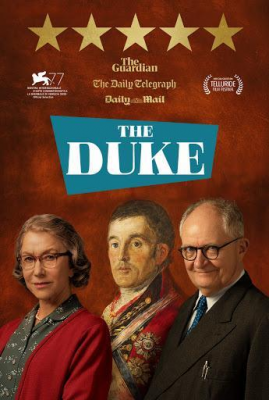Film: The Duke

The Duke is a quintessentially English film about the stealing of Goya's portrait of The Duke of Wellington from the National Gallery in 1961. This is the only time a painting has been stolen from the Gallery. It was assumed it was the work of a criminal mastermind, a sophisticated gang stealing to order - and even featured in a James Bond film. In reality it was a redundant taxi driver from Newcastle (or so it seemed). A Quixotic character, Kempton Bunton schemed to use the painting as a ransom in exchange for free TV licences for pensioners and veterans.
Pitch perfect performances from a stellar cast led by Jim Broadbent - in a part tailor made for him - are a delight. He is superb as Kempton Bunton, the quirky aspiring script writer with a social conscience representative of Everyman.
Helen Mirren, unrecognisable as Dorothy, his long suffering, down trodden wife, consumed with grief for their dead daughter, gives an exceptional, poignant performance. The director's wife, Anna Maxwell Martin, plays the classy wife of a local councillor who Dorothy works for as a domestic.
Directed by Roger Michell, of Notting Hill fame, the film was completed just before lockdown. Tragically he died in September 2020 following rave notices at the Venice Film Festival. The planned general release in autumn 2020 was delayed by the pandemic. Following a series of previews, general release is now 24th February.
The film opens with Kempton pleading not guilty to stealing the portrait at his trial at the Old Bailey. Flashing back six months to spring 1961 in Newcastle, he campaigns on the streets, petitioning about TV licensing, a very topical subject at present. Soon after sending another failed script to the BBC, he is jailed for not having a TV licence, although he has removed the function to watch BBC.
Following 13 days in Durham prison, we see him visiting daughter Marion's grave with his son, Jackie, accompanying him. Jackie is an aspiring shipbuilder and elder brother, Kenny is 'in construction' but up to some unnamed illegal activities. Sacked for regaling passengers with his eccentric philosophy, Kempton tells Dorothy he's going to London to gain publicity for his anti-TV licensing campaign. He was incensed on reading that the government had paid £140,000 to keep Goya's portrait of the Duke of Wellington in this country. The scene is set for the real life robbery.
The viewer sees the portrait of the Duke of Wellington stolen from the National Gallery. A ladder is placed against an external wall to the lavatory window but we do not see WHO enters and takes the portrait. Upon Kempton's return to Newcastle, he and Jackie are seen making a false back to the wardrobe to hide The Duke.
Kempton sends a series of ransom notes to the government, saying that he would return the painting on the condition they improve care for the elderly.
Four years later he decides to return the artwork, when son Kenny's girlfriend discovers the hidden painting, and 'wants in' on what she imagines is a heist. In the film, he walks into the National Gallery with The Duke under his arm and is arrested. In reality he placed it in a left luggage locker at Birmingham New Street Station and six weeks later handed himself in at the police station.
Bunton's barrister, a suave sympathetic performance by Matthew Goode as Jeremy Hutchison, spouse of Peggy Ashcroft at the time, strikes up a good relationship with the self-educated erudite Bunton. Hutchison attests that Bunton 'borrowed' the painting, with the intent of pressurising the government to change licensing for the elderly and veterans. The law at the time recognised that if there was no intent to profit from larceny it was not a crime, he argues. The public gallery erupts in support of the working class hero throughout the trial. Anna Maxwell Martin bursting into song with a rendition of Jerusalem at full pelt from the court gallery being one of the films' many memorable moments.
In 2021 the National Gallery released a previously confidential file as part of a Freedom of Information request. The contents provide an interesting twist at the end of the film - which I won't reveal.
As for the portrait of The Duke - it can be seen in Room 45 at The National Gallery- for free.
TV licences were eventually free for pensioners over 75 in 2000 but are now a cause of contention again.
The Duke's screenplay is by Richard Bean and Clive Colman; this cinematic gem is a masterclass in British understatement and will surely gather a cluster of BAFTA nominations.
Watch the official trailer here: www.youtube.com/watch?v=JWigK5hzBmQ
On general release 24th February in Odeon Cinemas


















